|
|
|
Sort Order |
|
|
|
Items / Page
|
|
|
|
|
|
|
| Srl | Item |
| 1 |
ID:
061487
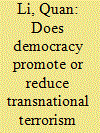

|
|
|
| 2 |
ID:
109910
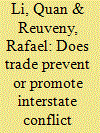

|
|
|
|
|
| Publication |
2011.
|
| Summary/Abstract |
Competing theories argue, respectively, that more trade reduces, increases, or does not affect interstate military conflict. We offer a new general theory on how trade affects conflict, which encompasses the liberal logic and the neo-Marxist/neo-mercantilist mechanism of asymmetric dependence and offers alternative explanations to the effects predicted by the bargaining and classical realist approaches. If a country expects its conflict toward a target to reduce the price of its import from or increase the price of its export to a target, it has an economic incentive to initiate conflict, and vice versa. These expectations can vary across trade flow directions and economic sectors. Using our model, we predict the effects of increases in exports and imports in five sectors on military conflict initiation. Statistical analysis of directed dyads from 1970 to 1997 largely supports our predictions. Rises in the initiator's imports of agriculture/fishery, energy, and chemical/mineral goods and exports of miscellaneous consumption goods reduce the likelihood of conflict initiation; rises in the initiator's exports of energy and both imports and exports of manufactured goods increase the likelihood. We evaluate implications for the literature and public policy.
|
|
|
|
|
|
|
|
|
|
|
|
|
|
|
|
| 3 |
ID:
052178
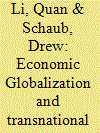

|
|
|
|
|
| Publication |
April 2004.
|
| Summary/Abstract |
The effect of economic globalization on the number of transnational terrorist incidents within countries is analyzed statistically, using a sample of 112 countries from 1975 to 1997. Results show that trade, foreign direct investment (FDI), and portfolio investment have no direct positive effect on transnational terrorist incidents within countries and that economic developments of a country and its top trading partners reduce the number of terrorist incidents inside the country. To the extent that trade and FDI promote economic development, they have an indirect negative effect on transnational terrorism
|
|
|
|
|
|
|
|
|
|
|
|
|
|
|
|
| 4 |
ID:
085694


|
|
|
| 5 |
ID:
065122


|
|
|
|
|
| Publication |
Jul-Aug 2005.
|
|
|
|
|
|
|
|
|
|
|
|
|
|
|
|
| 6 |
ID:
021409
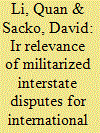

|
|
|
|
|
| Publication |
March 2002.
|
| Description |
11-43
|
|
|
|
|
|
|
|
|
|
|
|
|
|
|
|
| 7 |
ID:
103304


|
|
|
|
|
| Publication |
2011.
|
| Summary/Abstract |
Food security is of great urgency in the developing world. Many countries have sought to attract foreign capital to promote development and reduce hunger. But how do foreign direct investment (FDI) inflows affect food security? Extant research based on dependency and modernization arguments or the globalization debate offers contradictory theoretical predictions and produces conflicting evidence. We resolve the puzzle by disaggregating FDI. Foreign investments in distinct economic sectors have disparate attributes, producing different welfare consequences for food security. We test our arguments using the food security indicators recommended by the Food and Agriculture Organization (FAO) and new data on sector-specific FDI inflows to 56 developing and transition economies between 1981 and 2001. We find highly robust evidence that manufacturing FDI improves food security. We also find that primary-sector FDI reduces food security and that service-sector FDI has an ambiguous but sometimes negative effect. These results are largely robust under different statistical methods, additional control variables, and alternative measures of food security. Our research offers policy lessons for how to improve food security and demonstrates how to resolve theoretically the long-standing dependency-modernization controversy that has informed the contemporary debate between the pro- and anti-globalization camps.
|
|
|
|
|
|
|
|
|
|
|
|
|
|
|
|
| 8 |
ID:
175842
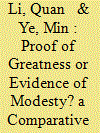

|
|
|
|
|
| Summary/Abstract |
Any serious discussion about the consequences of China’s rise must start with a systematic and rigorous assessment of China’s actual influence and status in the international system. In this article, we examine a widely used indicator in the debate about China’s international status. Although many existing studies see China’s active participation in United Nations (UN) Peacekeeping Operations as incontestable evidence of China’s great power status, others contend that it signifies the status of only a middle power. We posit that China’s policy behaviour should be evaluated in a comparative manner, and from a dynamic perspective. After comparing the patterns and features of China’s personnel contributions with that of 20 other major countries in the world, we find that China’s behaviour is more similar to that of developing ‘middle powers’, such as Turkey, India, and Brazil, as opposed to established ‘great powers’ such as other permanent members of the UN Security Council or traditional ‘western middle powers’.
|
|
|
|
|
|
|
|
|
|
|
|
|
|
|
|
| 9 |
ID:
168401


|
|
|
|
|
| Summary/Abstract |
Half a century after the “Second Great Debate” in international relations (IR) started, scholars still perceive the qualitative versus quantitative division as their principal divide, and yet we do not have a good grasp of the impact of this divide. My research explores how the divide shaped the incentives and behaviors of scholars and influenced the organization of our academic communities and knowledge production. The impact of the divide expressed itself in the distribution of research among methodologies in terms of relative quantity and impact. Less obviously, and yet more importantly, the divide influenced the distribution of quantitative research among different institution types, across fields and journals, and with respect to policy engagement. Using the TRIP database of 7,792 IR articles in twelve top journals from 1980 to 2014, I classify journal articles into three categories—quantitative-only, qualitative-only, and mixed-methods—and categorize author institutions into similar types—publishing quantitative research only, producing nonquantitative work only, and publishing various proportions of quantitative research. Notably, qualitative and quantitative works switched positions over time in terms of relative quantity and impact, with quantitative research more likely published but only slightly more cited in the recent decade. More importantly, the divide produced other less obvious but more serious outcomes. Among 1,111 institutions that ever published IR research in twelve top journals over thirty-five years, two-thirds published nonquantitative research only; fifty-three institutions published more than half of all quantitative articles; institutions publishing quantitative-only or nonquantitative-only research constituted two modal categories. Political science journals published more quantitative research, persistently and with growing convergence; IR journals also evolved toward publishing more quantitative research though with persistent divergence and forming two clusters. Quantitative articles and political science journals were significantly less engaged in providing policy prescriptions than qualitative articles and IR journals. To overcome this lasting and self-perpetuating divide, we must better understand its impact, learn to appreciate alternative approaches, and change the way we train future scholars.
|
|
|
|
|
|
|
|
|
|
|
|
|
|
|
|
| 10 |
ID:
161424


|
|
|
|
|
| Summary/Abstract |
A large body of research examines the relationship between democracy and foreign direct investment (FDI). Scholars offer numerous arguments about why democratic institutions encourage or discourage FDI. Yet, almost all statistical work examines whether democracies receive more or less FDI than nondemocracies. Direct evidence on the underlying theoretical mechanisms that might account for such variation remains scant. We perform a metaregression analysis to test whether proposed mechanisms are consistent with observable evidence from previous studies or not. Our sample includes 229 model estimates from forty prior studies. We reach three major findings with respect to theoretical mechanisms, FDI measurement, and publication bias. Our research demonstrates that metaregression provides a useful tool for adjudicating theoretical arguments and evaluating publication bias, especially when the accumulated literature presents contradictory findings.
|
|
|
|
|
|
|
|
|
|
|
|
|
|
|
|
|
|
|
|
|